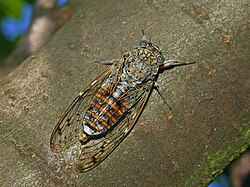| Cicada | |
|---|---|
 | |
| Cicada orni , dorsal view | |
| Scientific classification | |
| Kingdom: | Animalia |
| Phylum: | Arthropoda |
| Class: | Insecta |
| Order: | Hemiptera |
| Suborder: | Auchenorrhyncha |
| Family: | Cicadidae |
| Subfamily: | Cicadinae |
| Tribe: | Cicadini |
| Subtribe: | Cicadina |
| Genus: | Cicada Linnaeus, 1758 |

Cicada is the type genus of cicadas in the family Cicadidae and the tribe Cicadini. Historically, a large number of species have been described as "Cicada", but are now placed elsewhere; valid species are mostly found in the Palaearctic realm and Indian subcontinent. [1]